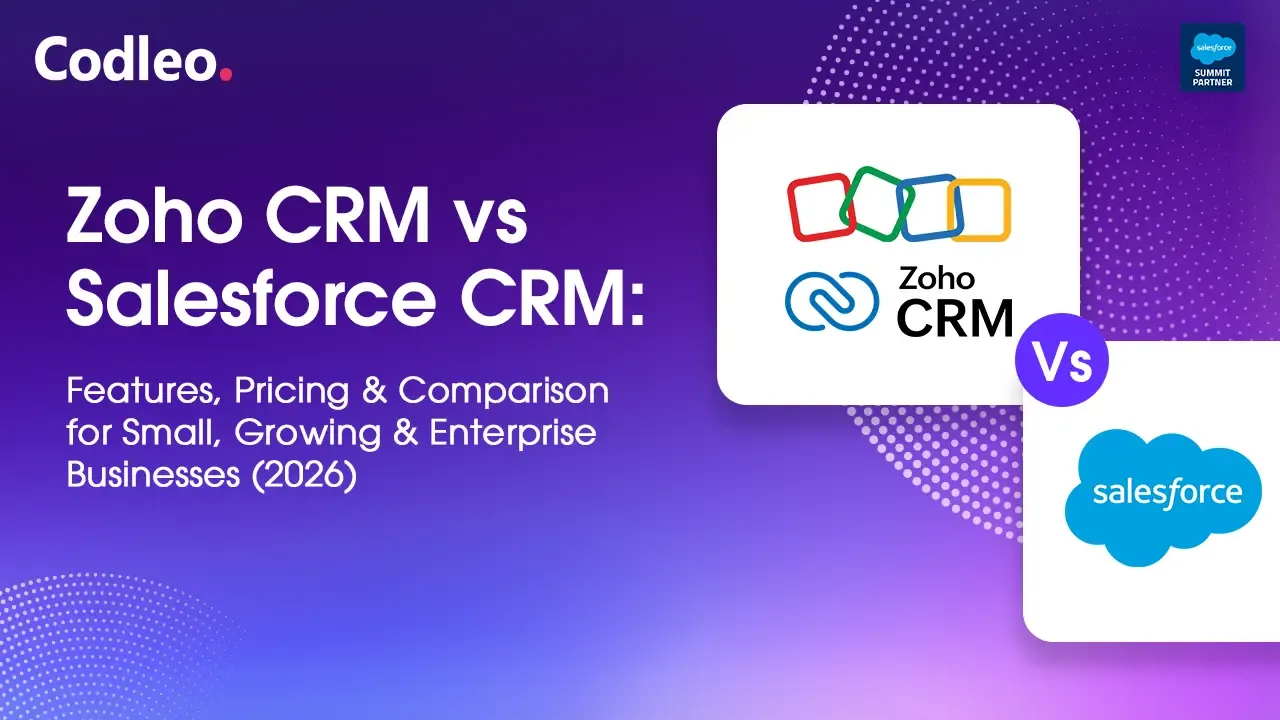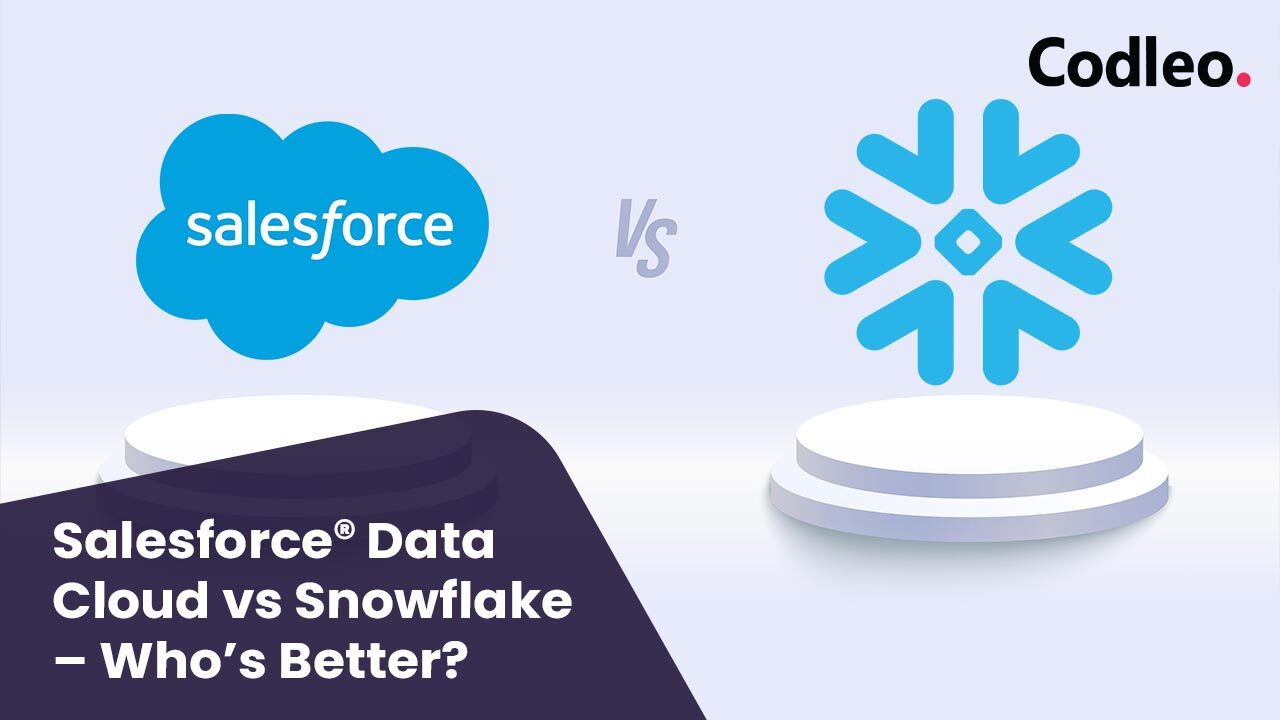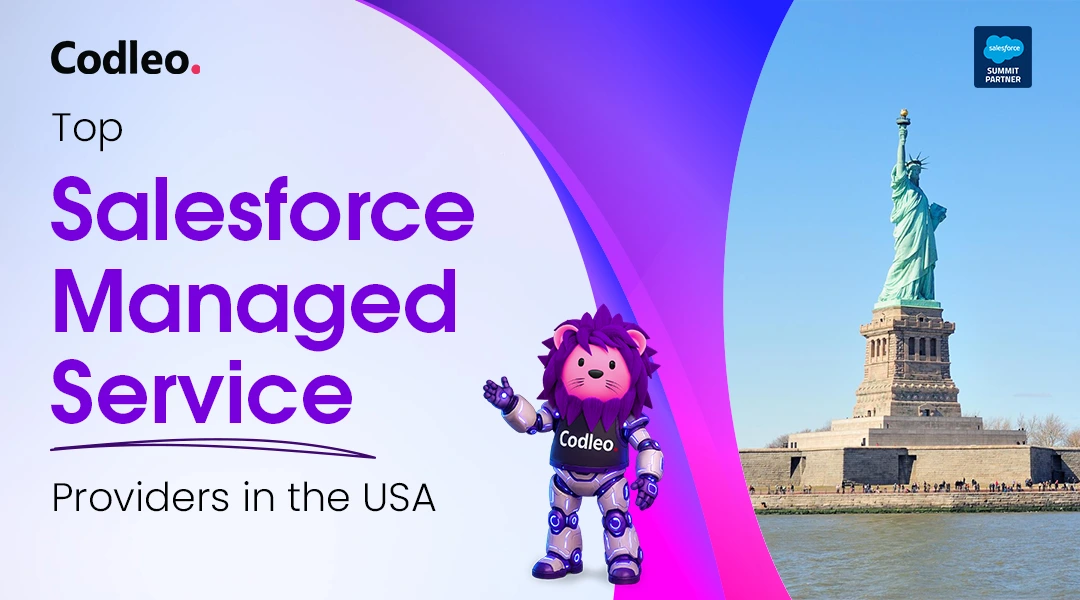
SALESFORCE DATA CLOUD VS SNOWFLAKE – WHO’S BETTER?

In today's digital world, data is king. It shapes business strategies and improves customer experiences, making it essential for modern companies. Why is data important? Data is the foundation for making smart decisions, no matter the size or industry of a business. It offers crucial insights into what customers want, market trends, and how to run operations more smoothly. By using data effectively, companies can improve their processes, create personalized experiences, and stay competitive. Whether it’s refining products or making operations more efficient, the importance of data in our data-driven economy is undeniable.
Data, Data Everywhere -- Big Data vs. Smart Data
As data continues to grow rapidly, two key ideas have emerged: big data and smart data. Big data refers to the massive amounts of information collected from various sources, while smart data is about pulling useful insights from all that data. With the explosion of data, businesses now face the challenge of not just gathering data, but also making sense of it. By using advanced analytics and machine learning, companies can turn big data into smart data, allowing them to make precise, data-driven decisions quickly and effectively.
Why Data Management & Visualization is Important?
Good data management and visualization are essential to making the most of your data. With so many different sources and formats of data available, organizations must have strong data management systems in place to maintain data quality, consistency, and security. On top of that, data visualization tools help people understand and use data more easily, supporting quick, informed decision-making throughout the company. By turning complex data into easy-to-read dashboards and reports, businesses can spot trends, patterns, and issues, enabling them to act quickly and achieve better results.
Salesforce Data Cloud – An Overview
Salesforce Data Cloud is a centralized platform designed to bring all your customer data together in one place. It provides real-time insights that are both comprehensive and actionable, covering various customer interactions. What makes Salesforce Data Cloud stand out is its smooth integration with the rest of the Salesforce ecosystem. By connecting easily with existing Salesforce tools, it enhances marketing efforts by delivering deep customer insights.
With Salesforce Data Cloud, businesses can move beyond fragmented data sources and siloed systems. They can use a unified data platform to get a complete view of their customers. This unified approach allows organizations to offer personalized experiences on a large scale, build stronger customer relationships, and create more meaningful interactions. Additionally, Salesforce Data Cloud gives marketers the flexibility to adapt to changing customer needs and market trends, boosting their competitive advantage.
More than just a data management tool, Salesforce Data Cloud becomes a strategic asset for businesses aiming to succeed in today’s fast-paced digital world. By harnessing the power of unified customer data, it sets the stage for exceptional customer engagement and long-term growth.
Snowflake – An Overview
Snowflake is a powerful cloud-based data warehousing solution designed to manage large volumes of data with exceptional efficiency. As a leading platform, Snowflake provides a full range of data storage, processing, and analytics tools to meet the needs of today’s businesses. Its standout feature is the ability to handle massive amounts of data seamlessly, allowing organizations to gain valuable insights on a large scale.
One of Snowflake’s major advantages is its compatibility with multiple cloud environments like AWS, Azure, and Google Cloud. This flexibility allows businesses to use their preferred cloud infrastructure while benefiting from Snowflake’s advanced features. By moving away from the limitations of traditional on-premises data centers, Snowflake helps organizations take full advantage of the agility and scalability of cloud computing.
Snowflake marks a significant shift in data management, providing a strong foundation for companies looking to maximize the value of their data. With its cloud-native design and advanced capabilities, Snowflake enables businesses to innovate, improve operations, and make smarter decisions in today’s data-driven landscape.
Salesforce Data Cloud vs. Snowflake – Key Features Comparison
When it comes to customer data, Salesforce Data Cloud and Snowflake are two leading options, each with its strengths. This comparison highlights their key features to help you choose the one that best fits your needs for customer insights and marketing personalization.
Feature 1 - Data Integration Capabilities
Salesforce Data Cloud excels in data integration with its built-in tools that automatically sync with Salesforce applications, ensuring a smooth flow of data and reducing the need for manual work. On the other hand, Snowflake offers a wider range of data integration options but often requires extra setup or third-party tools.
Picture customer data seamlessly flowing from your Salesforce apps into a unified platform—that's the power of Salesforce Data Cloud. Its native integration tools handle everything automatically, making sure your data stays consistent without much manual effort. Snowflake, though it supports more data sources, usually needs extra configuration or external tools to achieve the same level of integration.
Feature 2 - Real-time Data Processing
Salesforce Data Cloud is highly effective at processing data in real time, providing immediate insights that are essential for dynamic customer engagement. This ability allows you to react quickly and personalize interactions as they happen. While Snowflake offers real-time analytics, it is generally better suited for batch processing, which can make it less responsive in situations that demand quick action.
In today's fast-paced customer environment, having real-time insights is key to success. Salesforce Data Cloud excels in this area, processing customer data instantly and delivering insights that let you personalize experiences on the fly. Snowflake, though capable of real-time analytics, is primarily optimized for batch processing, making it less ideal for time-sensitive needs.
Feature 3 - User Interface and Ease of Use
Salesforce Data Cloud is designed with a user-friendly interface that is easy to navigate, even for those without a technical background. This makes it simple for anyone to manage and analyze customer data without needing extensive technical knowledge. In contrast, Snowflake is geared toward a more technical audience, with a powerful but more complex interface that requires a deeper understanding of data management.
Not everyone is a data expert, and Salesforce Data Cloud makes sure that users of all skill levels can easily manage and analyze data. Its interface is straightforward, so you can quickly access the insights you need. Snowflake, while powerful, is more suited for technical users who are comfortable with a steeper learning curve and have a solid grasp of data management principles.
Feature 4 - Scalability
Both Salesforce Data Cloud and Snowflake are designed to grow with your business, but they excel in different ways. Salesforce Data Cloud is particularly good at handling the variable workloads common in customer-focused operations, adjusting smoothly to spikes in data, such as during holiday sales or marketing campaigns. Snowflake, on the other hand, is built for consistent, high-volume data processing, making it ideal for businesses that need to manage large amounts of data regularly.
When it comes to scaling your business, both Salesforce Data Cloud and Snowflake rise to the challenge. Salesforce Data Cloud is great at adapting to changes in data volume, such as during busy sales periods or targeted campaigns. Snowflake, however, shines in environments where consistently high data volumes need robust management on an ongoing basis.
Some Examples - Use Cases
Modern businesses face the challenge of choosing the right tools to effectively harness the power of data. Let’s explore two leading solutions, Salesforce Data Cloud and Snowflake, through real-world use cases in marketing applications and enterprise data warehousing, highlighting their distinct strengths and applications.
Use Case 1 - Marketing Applications
Salesforce Data Cloud is a powerful tool for marketing professionals. Its ability to create detailed customer profiles and run segmented campaigns using real-time data is invaluable. With Salesforce Data Cloud, businesses can fine-tune their marketing strategies to deliver personalized experiences that truly connect with their audience. Although Snowflake is excellent for storing and analyzing large data sets, it doesn't have the built-in marketing features that Salesforce Data Cloud offers, making it less ideal for targeted marketing efforts.
Use Case 2 - Enterprise Data Warehousing
Snowflake excels when it comes to enterprise data warehousing. Its cloud-based design and scalability make it a top choice for companies dealing with extensive data management needs. However, for businesses focused on customer-centric data strategies, Salesforce Data Cloud provides more specialized tools and insights. With its seamless integration with Salesforce applications and emphasis on unifying customer data, Salesforce Data Cloud helps organizations extract actionable insights specifically aimed at improving customer experiences and driving growth.
Salesforce Data Cloud vs. Snowflake - Cost Consideration & ROI
In today’s data-driven world, choosing the right platform for data management and analytics is key to maximizing ROI while keeping costs under control. Let’s explore the cost considerations and ROI implications of two leading platforms: Salesforce Data Cloud and Snowflake. By analyzing their pricing models, potential returns, and customer feedback, businesses can make well-informed decisions to optimize their data strategies and achieve sustainable growth.
Pricing Models
When comparing Salesforce Data Cloud and Snowflake, it's important to understand their different pricing structures. Salesforce Data Cloud typically uses a pricing model based on factors like the number of data records and user licenses. This approach is particularly cost-effective for marketing teams, allowing them to expand their operations without facing high costs. Snowflake, on the other hand, has a pricing model that varies depending on data storage, computing requirements, and the use of cloud services. While Snowflake offers the flexibility to customize pricing based on specific needs, businesses must carefully consider their usage patterns and anticipated data growth to ensure cost efficiency.
Return on Investment
Investing in Salesforce Data Cloud can deliver substantial returns, especially for businesses focused on using customer data to enhance sales and improve customer service. By bringing together all customer data and supporting personalized marketing efforts, Salesforce Data Cloud helps companies build stronger customer relationships and increase revenue. On the other hand, Snowflake’s ROI often comes from its powerful data warehousing and processing abilities. While Snowflake excels at managing and analyzing large datasets, its impact on CRM may not be as immediate or direct as what Salesforce Data Cloud offers.
Customer Reviews & Market Reception
User feedback provides valuable insights into the advantages and drawbacks of both platforms. Users of Salesforce Data Cloud frequently praise its smooth integration with other Salesforce tools, which allows for comprehensive management of customer data across different channels. They also value its ability to turn customer data into actionable insights that support strategic decision-making. On the other hand, Snowflake users often highlight its outstanding performance and scalability, making it easy to manage large amounts of data. However, some users note that optimizing Snowflake’s features can be complex and potentially costly, particularly for organizations with changing data requirements.
Future Prospects and Developments
Looking ahead, both Salesforce Data Cloud and Snowflake are set to continue evolving and improving. Salesforce Data Cloud is enhancing its artificial intelligence (AI) features to offer even more tailored customer experiences. By using AI to predict customer needs and preferences, organizations can increase engagement and build loyalty. Meanwhile, Snowflake is working on boosting its performance and expanding its data sharing capabilities. These updates are designed to strengthen Snowflake's position as a top data warehousing solution, providing excellent scalability and efficiency for managing various data tasks.
My Thoughts
Choosing between Salesforce Data Cloud and Snowflake depends on your business’s future goals. If your focus is on gaining real-time, actionable data insights to enhance customer relationships, Salesforce Data Cloud is likely the better choice. Its seamless integration and AI capabilities offer a forward-looking approach to customer engagement. On the other hand, Snowflake excels in providing robust, scalable data warehousing solutions, making it ideal for managing large volumes of data as we move into a data-driven future.
What has been your experience with Salesforce Data Cloud and Snowflake? Have certain features or capabilities played a key role in your decision? Share your thoughts with us at Codleo Consulting, and let’s shape the future of data-driven innovation together. As technology advances, choosing the right platform today will help you navigate the evolving landscape of business challenges and opportunities.
Are you ready to transform your data strategy and unlock the full potential of your Salesforce investment? At Codleo Consulting, a leading Salesforce consulting firm and trusted Salesforce partner company, we're dedicated to guiding you through every step of your data journey. Whether you're looking to leverage the Salesforce Data Cloud for enhanced customer insights or optimize your data warehousing with Snowflake, our team of experts is here to provide tailored solutions that drive growth and innovation. Contact us today to discover how Codleo Consulting can empower your business with cutting-edge data strategies and exceptional Salesforce support. Let’s turn your data into a powerful asset for your success!
Latest Blog
Say "hello" to us and lets gets talking
Partner with the best team in the world for your CRM or other digital needs.
Contact Us




